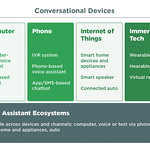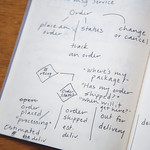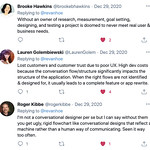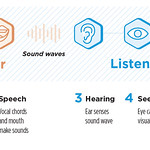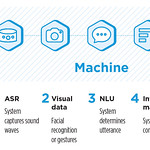Conversations with Things

UX Design for Chat and Voice
Welcome to the future, where you can talk with the digital things around you: voice assistants, chatbots, and more. But these interactions can be unhelpful and frustrating—sometimes even offensive or biased. Conversations with Things teaches you how to design conversations that are useful, ethical, and human-centered—because everyone deserves to be understood, especially you.
Who this book is for
- Design practitioners involved in creating digital products, who are beginning their journey into conversational interfaces.
- Developers who have built voice or chatbot projects, but may not be familiar with advanced design – or even what it truly means to design something.
- Other non-technical members of the team, like PMs and BAs who need to understand the process, and sales reps new to conversational interface products.
Welcome to the future, where you can talk with the digital things around you: voice assistants, chatbots, and more. But these interactions can be unhelpful and frustrating—sometimes even offensive or biased. Conversations with Things teaches you how to design conversations that are useful, ethical, and human-centered—because everyone deserves to be understood, especially you.
Who this book is for
- Design practitioners involved in creating digital products, who are beginning their journey into conversational interfaces.
- Developers who have built voice or chatbot projects, but may not be familiar with advanced design – or even what it truly means to design something.
- Other non-technical members of the team, like PMs and BAs who need to understand the process, and sales reps new to conversational interface products.
Testimonials
Deibel and Evanhoe lay out best practices for conversation design using practical, actionable examples, and do it in such a way that it’s a delight to read.
—Cathy Pearl, author of Designing Voice User Interfaces
As conversational interfaces continue to become a part of our daily lives, more and more of the UX community are faced with the challenge of designing conversations. Thankfully, they now have this book to help them run a successful design process. With this book, the UX community finally has a comprehensive but easy-to-read guide to navigate the nuanced and sometimes messy process of conversation design.
—Mark C. Webster, Director of Voice and Audio Products, Adobe
Conversations with Things is a wonderful resource for designers working with voice. Throughout the book, Diana and Rebecca lay out a good foundation for designers to create inclusive and accessible conversations.
—Regine Gilbert, author of Inclusive Design for a Digital World, designer and educator
Conversations with Things is a solid, practical introduction to the nuts and bolts of designing for bots.
—Kim Goodwin, author of Designing for the Digital Age
Thoroughly researched and peppered with valuable inputs from industry experts, the authors tackle conversation design topics from the basics of prompt-writing to the intricacies of designing for accessibility. I can give no greater praise than this: I learned a lot, and enjoyed every minute of this book!
—Lisa Falkson, Senior VUI Designer, Amazon
This is a must-read for anyone looking to get started or dive deeper into conversational design. It was thought-provoking and inspirational! I loved how this book addressed a critical need for discussion around diversity, bias, and accessibility.
—Noelle Silver, Founder, AI Leadership Institute
This is a book that everyone even remotely connected with marketing and customer service should read, regardless of whether you’re a budding conversation designer or not.
—Kane Simms, CEO and Co-Founder, VUX World
Table of Contents
Foreword by Kat Vellos
Chapter 1: Why Conversation Design?
Chapter 2: Talking Like a Person
Chapter 3: Crafting Trustworthy Personalities
Chapter 4: Designing Prompts
Chapter 5: Defining User Intent
Chapter 6: Documenting Conversational Pathways
Chapter 7: Building Context
Chapter 8: Complex Conversations
Chapter 9: Researching and Prototyping
Chapter 10: Launching the Conversation
Chapter 11: Designing Inclusive Conversations
FAQ
These common questions and their short answers are taken from Diana Diebel and Rebecca Evanhoe’s book Conversations with Things: UX Design for Chat and Voice. You can find longer answers to each in your copy of the book, either printed or digital version.
-
- What do you mean by “conversations with things”?
This book is about designing for conversational interfaces—any technology that people talk to, whether they’re speaking out loud to it or typing. Think of things like voice assistants and chatbots, or any interface where conversation is the primary input or output.
We call these interactions between people and talking technology conversations with things to emphasize that while they mimic person- to-person exchanges, these computerized conversational partners aren’t people. There’s a rundown of these technologies (and a whole bunch of useful definitions) in Chapter 1, “Why Conversation Design?”
- What do you mean by “conversations with things”?
Sample Chapter
This is a sample chapter from Diana Deibel & Rebecca Evanhoe’s book Conversations with Things. 2021, Rosenfeld Media.
Chapter 1: Why Conversation Design?
Rebecca: Hey, folks. Does anyone out there know how to make voice experiences more accessible?
Diana: Yes, I heard a great talk about that a month ago. This is something I’m trying to learn more about, too. I’d be happy to share my notes—want me to send them to you?
Rebecca: I’d love to see your notes! Thanks for being so helpful.
This conversation, held over a community Slack channel in 2018, is the origin of our friendship and this book. At the time, we were both about six years into careers in the tech industry. We finally felt like we knew what we were doing—enough to start noticing where the technology was short-changing people, and enough to start getting opinionated about the conversational interfaces we worked on.





